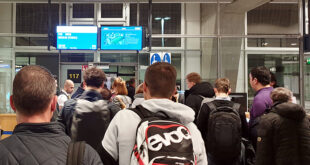New quarantine rules for people entering Germany from risk areas enters into force on 8 November. Up to now, anyone returning to Germany from a risk area has been subject to compulsory testing and quarantine. The new regulation provides for a reduction of the quarantine period from 14 to 10 days.
What are the new rules?
Anyone who has been in a country or region classified as a risk area (Risikogebiet) during the ten days before returning to Germany must go into self-isolation for ten days immediately after their return and must also report to the local health authorities (Gesundheitsamt). If you want to end the quarantine prematurely, you can have a corona test at the earliest five days after entering the country. The quarantine ends when the test is negative. However, if Covid-19 symptoms appear within ten days of the test, the person must go to a doctor or a test centre to have another test carried out.
All travellers to Germany have to register online prior to their entry at www.einreiseanmeldung.de. The aim of the entry registration is to provide the health authorities at the destination of the traveller in Germany with the necessary information – for example, to be able to check whether the quarantine obligation under national law is being complied with. Anyone who has been in a corona risk area for the previous ten days must register. Also they must be able to present proof of this registration when entering Germany. If, in exceptional cases, a registration is not possible through the website mentioned above, travellers must instead fill a substitute registration form. Travellers are to hand over the completed form to the carrier or the authority entrusted with the policing of cross-border traffic upon request.
Further Information is available on an information sheet on the website of the Federal Ministry of Health .
What are the exceptions?
The regulation does not apply to people who are in German territory on transit. They must however leave Germany again by the quickest route. Moreover, travellers who have spent less than 24 hours in a risk area, for example, while travelling through neighbouring countries are not covered by the quarantine obligation.The exception also applies when visiting close relatives and spouses or life partners who do not belong to the same household.
Exceptions also apply to people who transport goods or merchandise by road, rail, sea or air – as well as high-ranking members of the diplomatic and consular services, people’s representatives and governments.
To which of Germany’s neighbouring countries does the new regulation apply?
The Robert Koch Institute, Germany’s centre for disease prevention and control, lists almost all countries bordering Germany as risk areas. The only exception is Denmark, whose border region with Germany is not yet a risk area. However, Denmark closed its borders to German holidaymakers in October anyway.
To find out which countries are listed as corona risk areas, click here.
Travel restrictions apply for entry into Germany from a large number of countries. These are issued by the Federal Ministry of the Interior, Building and Community. Please check with the Federal Ministry of the Interior (BMI) prior to your trip to find out what regulations apply specifically with regard to the country from which you plan to enter Germany here.
Vivian Asamoah
READ ALSO Corona Lockdown: These rules apply in Germany in November
 THE AFRICAN COURIER. Reporting Africa and its Diaspora! The African Courier is an international magazine published in Germany to report on Africa and the Diaspora African experience. The first issue of the bimonthly magazine appeared on the newsstands on 15 February 1998. The African Courier is a communication forum for European-African political, economic and cultural exchanges, and a voice for Africa in Europe.
THE AFRICAN COURIER. Reporting Africa and its Diaspora! The African Courier is an international magazine published in Germany to report on Africa and the Diaspora African experience. The first issue of the bimonthly magazine appeared on the newsstands on 15 February 1998. The African Courier is a communication forum for European-African political, economic and cultural exchanges, and a voice for Africa in Europe.




























